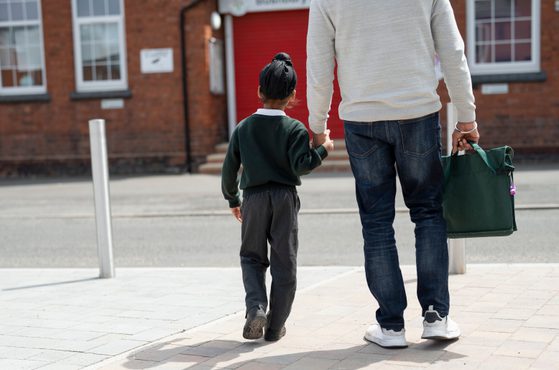
Child Arrangement Order — who can get one, how much does it cost and can you stop one
Consent orders formalise the agreement between parents for looking after their children following a divorce.
We make the difference. Talk to us: 0333 004 4488 | hello@brabners.com
Our nationally-recognised child law solicitors put your children’s best interests first.
Where child-related disputes are concerned, we’re firmly on your side — supporting you throughout the dispute resolution process and avoiding costly and lengthy court proceedings wherever possible.
Led by Cara Nuttall, a renowned “expert in domestic and international children cases, including abduction and surrogacy”, our Resolution-accredited team contains some of the country’s most widely known and respected children law experts.
This includes Hall of Fame lawyers, Leading Partners and Next Generation Partners, all celebrated for their pioneering work in this area. Collectively, we're a Chambers & Partners Band 1 law firm, a Legal 500 Leading Firm and recognised in The Times’ Best Law Firms.
We understand how emotional and detrimental a breakdown in your family unit can be for you and your children. It’s crucial to legally protect their future.
Our aim is to lift the burden and make it easier for your family to adapt to any changes in circumstances.
Talk to us by calling 0333 004 4488, emailing family@brabners.com or completing our contact form below.

From issues around access and visitation to schooling, medical treatment and religion, we’re committed to finding the right solutions for you and your children.
This may include stopping a parent from acting without your consent or facilitating a specific course of action through a child arrangements order.
Providing for your children financially is a key consideration following parental separation. We can guide you in securing the best arrangements for your children, whether around child maintenance, school fees or capital and property orders.
We also have deep expertise in handling complex international child-related issues. This includes relocation applications, advice upon jurisdiction and habitual residence, the cross-border enforcement of orders, mirror agreements in respect of international orders and international financial provision.
We also advise on the unlawful removal of children and child abduction cases.
With one of the most extensive and specialist children law offerings in the country, whatever your issue, we’ll approach your case sensitively and constructively and help you to discover the best possible outcome.
“Cara Nuttall is an expert in domestic and international children cases, including abduction and surrogacy.”
The Legal 500 2026
“Joe Ailion [has] a depth of understanding and empathy rarely seen in a solicitor... His honest and straightforward advice, coupled with a genuine warmth, created a sense of security for our family during a tumultuous time. For us, Joe is not just a solicitor — he’s a beacon of hope and reassurance.”
Family law client
“Brabners has one of the North of England’s largest family law teams, with expertise across financial, children, international and fertility work.”
The Times Best Law Firms 2025
“Danielle [Hutchinson], from the moment you and Brabners took on my case, your dedication, strategic thinking, dealings with a challenging other side and unwavering support were incredible. As a team, you've not only secured my future — you've helped to rebuild my life.”
Family law client
“The ’superb’ Jo-Anna Jellings is particularly sought after for children matters.”
The Legal 500 2025
“I am really happy with the outcome and glad that me and the boys can finally put this behind us and move on in life with a structured approach to seeing their mum. I would like to take this opportunity to thank you and the Brabners team. I would recommend your professional services to anyone.”
Anonymous family law client
“[Brabners] offers the best financial remedies advice and private children act dispute representation. They are attentive to detail, very passionate and crucially objective, so they advise thoroughly and sensibly.”
Family law client, The Legal 500 2024
“Brabners is outstanding and offers fantastic support and preparation at every stage of litigation.”
Anonymous family law client

Described as “private children law specialists of the highest calibre” in The Legal 500, the team is led by Cara Nuttall.
Cara is a qualified Children Arbitrator and “the go-to person for complex children's work with jurisdictional complications”. She’s supported an extensive group of sought-after specialists, which includes Leanne Instrall, Richard Rigg, Hannah Saxe, Chris Fairhurst, Joe Ailion and Jo-Anna Jellings.
All are recognised by The Legal 500 as key lawyers and renowned for advising on an array of child law issues, including those with a highly complex, sensitive or multi-jurisdictional aspect.
Our approachable team can support you wherever you are in the country, but our welcoming offices across Liverpool, Manchester, London, Leeds and Lancashire can provide a comfortable setting for these sensitive conversations.

Consent orders formalise the agreement between parents for looking after their children following a divorce.

If you believe that you should receive a higher amount of child maintenance, you may have legal recourse.


Our family law team represented the paternal grandparents of three young children where contact had been stopped by the children’s parents.
Read more

Our family law experts represented a high-profile international footballer in court proceedings concerning financial support for his child.
Read more

Our family law experts secured a Parental Order for a same-sex couple who traversed war zones to bring their child — born via surrogacy — home to the UK.
Read more

We explore how decisions around schools are made, the processes available to help parents to reach agreement and the court’s approach when they can't.
Read more

We share some top tips to help families to co‑parent amicably and organise child contact arrangements during the festive period.
Read more

The President of the Family Division has released a toolkit to support family Judges when writing to children.
Read more

The Family Justice Council has released new guidance on responding to a child’s unexplained reluctance, resistance or refusal to spend time with a parent and allegations of alienating behaviour.
Read more

Associate and family law specialist Joe Ailion explains what the process of seeking parental responsibility involves for extended family.
Read more

Here, Jo-Anna Jellings explains how a domestic abuse defence can be used to block a child’s return under the Hague Convention.
Read more

Our Head of Family Cara Nuttall offers her expert guidance to parents whose ex-partner hasn’t returned their child after a holiday or contact.
Read more

The addition of VAT on school fees will be a concern for some separated families, where a parent may be obliged to pay school fees as part of a court order.
Read more

Our family law experts represented a high-profile international footballer in court proceedings concerning financial support for his child.
Read more

Find answers to our most frequently asked questions about children law from our expert family solicitors.
Read more

Here we examine how costs orders and awards are handled in private family law cases.
Read more

We explore the options for separated parents who differ in their approach to sharing content of their child online.
Read more

Actress Sophie Turner has made an application to a court in New York for the return of her two children to the UK.
Read more

We explain the rules around parents relocating with children and what the courts look for when granting permission.
Read more

In this article Cara Nuttall looks at potential legal requirements when international parents separate.
Read more

In this article we look at potential legal requirements when parents separate and wish to relocate.
Read more

In this article Cara Nuttall looks at options for parents worried about the 'custody' of their child.
Read more

If you believe that you should receive a higher amount of child maintenance, you may have legal recourse.
Read more

Consent orders formalise the agreement between parents for looking after their children following a divorce.
Read more

Schedule 1 of the Children Act 1989 gives the court the power to make orders for financial provision for children.
Read more
Loading form...